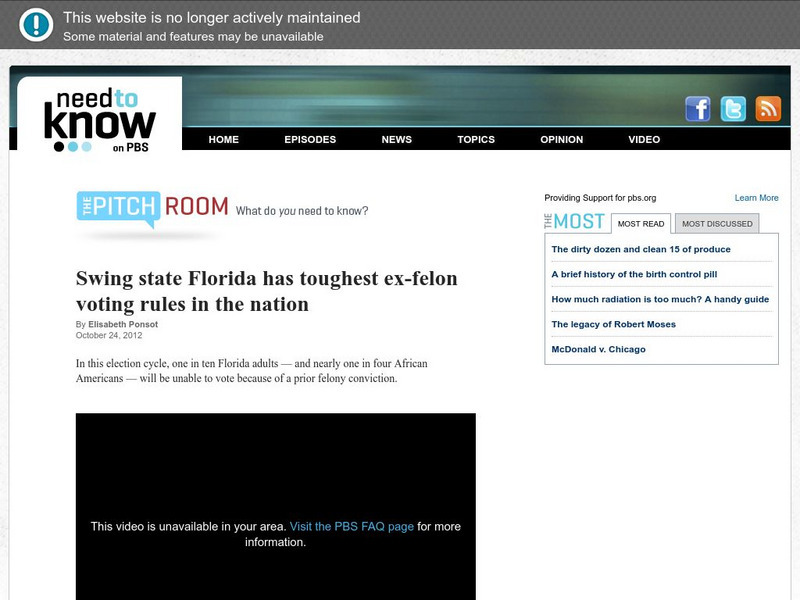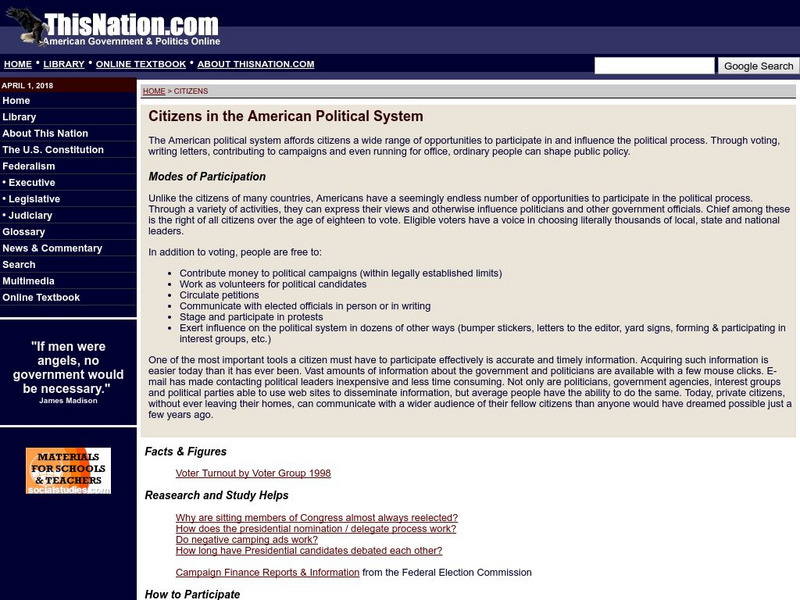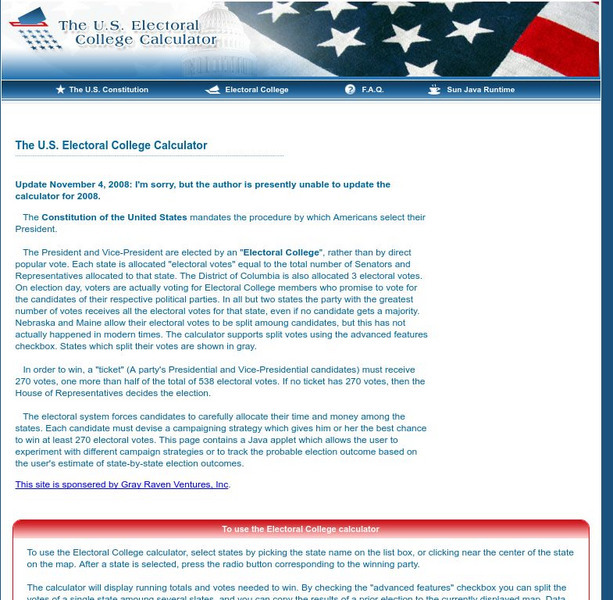Other
The Center for Voting & Democracy: Gerrymandering
This site provides a brief description of the term gerrymandering and where the term originated.
PBS
Pbs Learning Media: Election Central: Inside the Voting Booth
"Voting Time Machine," which presents case studies from different decades introduces students to the history of suffrage in America. Students prepare for the time when they can to vote through a customized, printable voter registration...
National Geographic
National Geographic: The Electoral College
Discover how the United States elects its president by using an Electoral College. A map shows how the Electoral College's 538 members are distributed throughout all fifty states and the District of Columbia.
PBS
Pbs Need to Know: Florida Ex Felon Voting Laws
Did you know that one in ten adults in Florida is currently not eligible to vote due to having been convicted of a felony? Find out how African Americans in particular are disproportionately affected. Article has particular emphasis on...
Council for Economic Education
Econ Ed Link: The Economics of Voting
Since the 1960s, many Americans eligible to vote have not bothered to do so- not even in presidential elections. Low rates of participation in voting have been worrisome to people interested in preserving our democratic traditions....
Council for Economic Education
Econ Ed Link: The Economics of Voting: What Do You Mean My Vote Doesn't Count?
This lesson explores the costs and benefits associated with voting in national elections. Specifically, the concepts of rational apathy, rational ignorance and expressive voting are explained.
Alabama Learning Exchange
Alex: What Do You Need to Know to Vote in Alabama?
Registering to vote, gathering information about the candidates, and casting a vote at the polls are vital parts of the process of selecting elected officials. Students will understand how the registration process works and how to cast...
Alabama Learning Exchange
Alex: Why Vote?
Learners will complete a web quest that includes reading material on the expansion of voting rights, viewing video on historical events related to suffrage, and completing a multimedia project (public service announcement). An extension...
Alabama Learning Exchange
Alex: Fact vs. Opinion
This instructional activity is a hands-on way for young scholars to learn how to discern between fact and opinion. This is an important skill for citizenship in that citizens should be informed about what is happening in their...
Alabama Learning Exchange
Alex: Who Will Be President?
This lesson will allow students to experience the election process of an American President through a mock election. Students will learn the steps that must be followed in order to have an election. This is a great way to get students...
Utah Education Network
Uen: Civics: Elections
Citizens of democratic countries consider voting one of their chief rights because it allows them to choose who will govern them. Learn about voting rights and the election process.
iCivics
I Civics: Got Ballot?
Covering everything from referendums to recalls, this lesson plan takes students to the voting booth and explains what they might see on a typical ballot.
iCivics
I Civics: Familiar but Flawed
This instructional activity highlights British influences on American government. Learn how America's Founders improved upon familiar structures of British government to contain tyranny in favor of liberty.
iCivics
I Civics: Election Results Tracker
Election Results Tracker activity helps young scholars monitor the election results with a map and Electoral College vote counter.
iCivics
I Civics: Running for President (Infographic)
Learn how candidates run the race to become President of the United States. Infographic shows who can qualify to run, how they must prepare, and the different hurdles they have to overcome to make it to Inauguration Day.
iCivics
I Civics: Voting: Will You Do It?
Voting isn't a requirement, but it is our responsibility and our right. Find out who can vote and the differences in voting by state.
Khan Academy
Khan Academy: Us History: 1800 1848: Expanding Democracy
An overview of voting and democracy in the early 1800s.
Khan Academy
Khan Academy: Us History: 1800 1848: Expanding Democracy
A quick comprehension check over the expansion of democracy in the early 1800s.
Louisiana Department of Education
Louisiana Doe: Louisiana Believes: Social Studies: Grade 2: Elections
In this instructional task, 2nd graders develop and express claims through discussions and writing in which explain the election process and the role a citizen plays in elections.
Louisiana Department of Education
Louisiana Doe: Curriculum Hub: Ela Guidebooks: Teenage Brain: Teen Decision Making and Behavior
Students research an age restricted privilege/right such as driving, drinking, and voting. Students conduct research to answer questions including: Why was the age limit for your privilege determined? When was it determined? Students use...
This Nation
This nation.com: Citizens in the American Political System
Contains information on becoming a U.S. citizen and how citizens can participate in the government.
Newspapers in Education
Ni Eonline: Cartoons for the Classroom: Draw Your Own Conclusions [Pdf]
Newspapers in Education and the Association of American Editorial Cartoonists developed this caption-writing exercise for a cartoon that lampoons voter apathy.
Other
Project Vote Smart: Homepage
Project Vote Smart provides an excellent page of links related to issues which are of interest in American politics.
Other
The u.s. Electoral College Calculator
Provides an overview of the electoral system and the process in which the president is elected. There is a visual calculator that lets you track election outcomes. Data for all U.S. elections is included.













